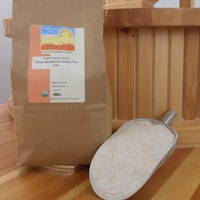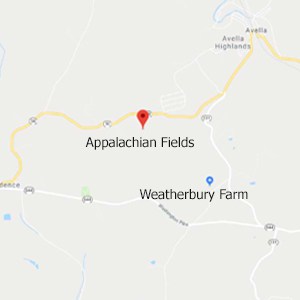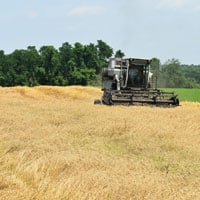Appalachian Wheat Facts 2021
In 2021 Appalachian Hard White Winter Wheat was grown in Independence Township on fields totaling acres on the farm established by Robert Leggett in 1815.
Leggett had holdings totally 585 acres in the area and raised 1000 sheep. In addition to being a farmer, he was a breeder and dealer of 1st class Spanish sheep (Merino). Today the farm still raises sheep. Weatherbury Farm transitioned this land from conventional in 2013; it was certified organic in 2015.
The wheat was planted on three fields totaling 6.27 acres on October 12, 2020 .
Clover was frost seeded into the wheat on March 7 & 8, 2020. (The clover suppresses weeds, aids in holding up the grain, increases soil organic matter, and eventually provides nitrogen to the next crop.)
The Appalachian Wheat was harvested on July 6,2021.
At the 2021 Washington County Fair, the Appalachian Wheat sheaf won 4th place and the jar of Appalachian Wheat grains won 2nd place.
For an illustrated explanation of how Weatherbury grains become flour, visit the from seed to flour page.
More information on Appalachian Hard White Winter Wheat below the pictures!
Preparing for planting Appalachian Wheat.
After the field is plowed (tractor on right), it is harrowed to smooth the seedbed.
Two weeks after planting, the Appalachian Wheat has emerged.
The event was captured by photographer Caroline Tompkins for an article on vogue.com
Appalachian Hard White Winter Wheat continues to grow over the winter and has more tillers than when photographed last year.
Appalachian Wheat needs to vernalize to produce grain. If you were to plant it in the spring, it would just look like grass.
See how the wheat has grown in 3 months.
Our grains are grown on contour strips. Here you can see Appalachian Wheat fields alternating with hay fields.
Contour farming can reduce erosion by up to 50%.
The Appalachian Wheat is almost ready to harvest.
Appalachian Bread Flour in the field!
Harvesting Appalachian Hard White Winter Wheat using our combine. The wheat will be unloaded into a gravity wagon for transport back to the farm.
About Appalachian Hard White Winter Wheat
Appalachian is a hard white winter wheat. Because the humidity in our area increases the incidence of disease in the fields, the eastern United States is not hospitable to growing hard white wheats. Luckily for us, North Carolina State developed Appalachian White Wheat which flourishes in our region.
Products Milled from Appalachian Wheat
Appalachian wheat is milled into organic unbleached whole and sifted Appalachian bread flour.
Health benefits of Wheat
Wheat is an excellent source of protein, dietary fibers, manganese and selenium. Wheat’s fiber boosts the digestive process and improves overall metabolism. The vitamin B content of wheat provides you with energy. Additionally, the complex carbohydrates in wheat keeps you feeling fuller longer and give you energy over a longer period.
Managanese, which wheat is rich in, acts as a co-factor for greater than 300 enzymes involved in the production of insulin and glucose secretion. Wheat’s betaine content prevents chronic inflammation, which is a key constituent in rheumatic pains and diseases. Additionally, its anti-inflammatory property reduces the risk of ailments like osteoporosis, heart diseases, Alzheimer’s disease, cognitive decline, and type-2 diabetes.
More Information
Appalachian bread flour can be ordered either for our monthly on-farm pickup or you can have your order sent to you.
To read more about Appalachian bread flour, please visit our products page.
More information on Appalachian Hard White Winter Wheat and other grains grown at Weatherbury Farm are on the grains we grow page.









